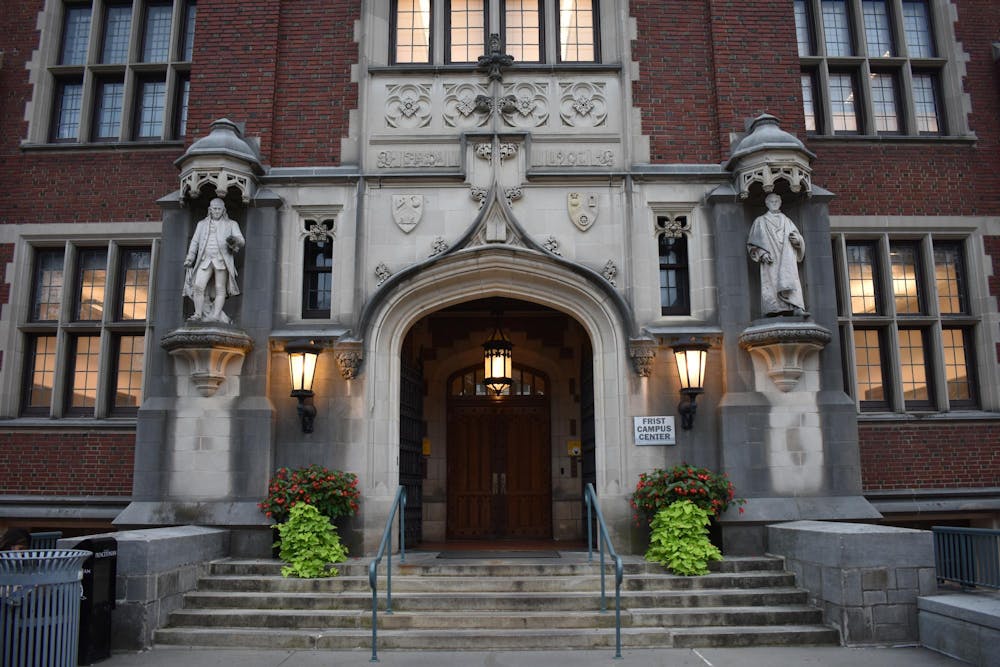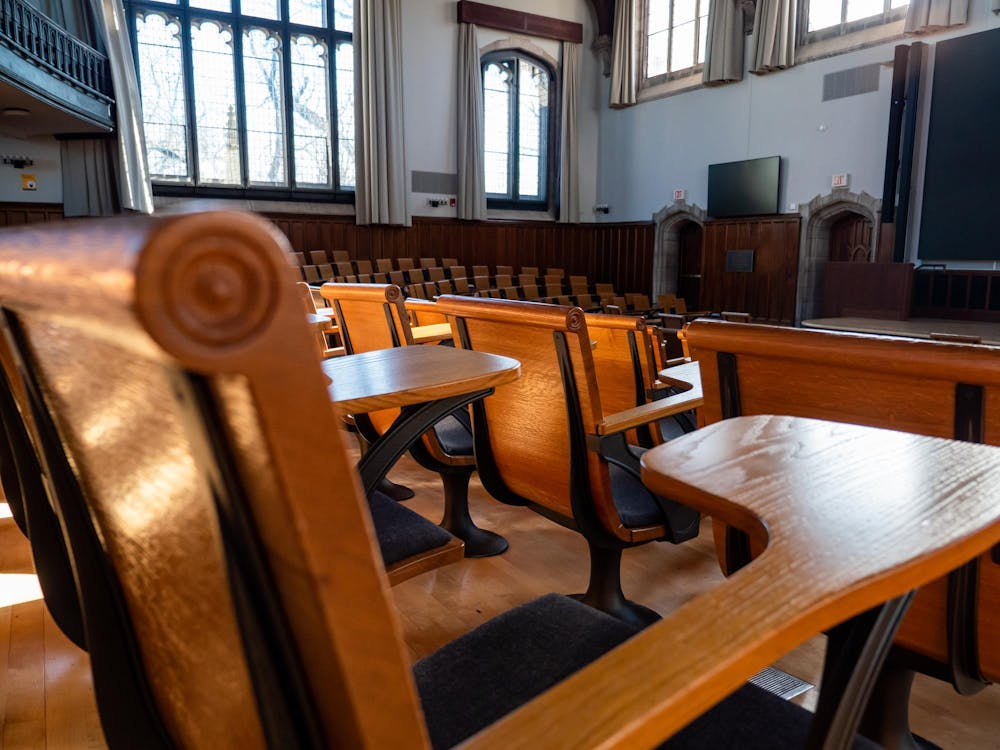The following is a guest contribution and reflects the author’s views alone. For information on how to submit a piece to the Opinion section, click here.
I write as a concerned alum with a long Princeton memory to openly and ardently oppose a dangerous proposal to amend the Council of the Princeton University Community Charter. University President Christopher Eisgruber ’83 charged the Committee on Rights and Rules to “review the role and procedures of the Judicial Committee.” Their ensuing recommendation would strip the CPUC Judicial Committee of its jurisdiction to hear and decide initial complaints of serious University rule violations, as well as severely curtail the right of appeal of University community members at large.
The Judicial Committee’s service as an independent judicial venue is vitally important to holding the University administration and the president accountable for misconduct. The Judicial Committee is predominantly composed of faculty and students. It currently has the power to review complaints and appeals independently of the administration. Eliminating the Judicial Committee’s ability to hear initial complaints would insulate the administration from this judicial scrutiny and accountability.
The Judicial Committee has a broad mandate under Section 5.6.1 of the CPUC Charter, not only over violations of rules and regulations against “recognized rights of members of the University community” but, further, over those violations that constitute “a serious offense against the University’s mission … or a substantial impairment of the common and legitimate interests of the University.”
The March 2025 presentation to the CPUC to justify the proposed curtailment of the Judicial Committee focused on the use of the Committee as the initial forum for disciplinary cases brought by the administration. Unfortunately, it failed to address or acknowledge that the Committee’s statement of jurisdiction also allows students, faculty, and others to bring before the Committee initial complaints against the University administration for violation of University rules.
The presentation and discussion at the CPUC meeting troublingly failed to address or acknowledge the outstanding controversy dating back to August 2023, in which the Judicial Committee refused to accept jurisdiction over complaints against the administration for violating University rules. At the March CPUC meeting to discuss the change, the role of the Judicial Committee in modern times was minimized, as the majority of cases were from the 1970s. It was noted that there was only one case being heard by the Judicial Committee at the time. But more complaints have been lodged with the Committee in the last two years — I filed four of them.
The CPUC Judicial Committee’s ability to review initial complaints is crucial to proper University governance and institutional integrity, because other mechanisms of review are fundamentally dominated by University administrators. As such, there arises a conflict of interest when the administration investigates itself, which often culminates in its declaring that it has done no wrong.
In 2021, the University’s first-year Orientation programming included a website called “To be Known and Heard,” which was recently taken down. On the website, Professor of Classics Joshua Katz was quoted saying that the former Black Justice League “made life miserable for the many (including the many black students) who did not agree with its members’ demands.” But the University website omitted the parenthetical “(including the many black students)” at that time, even though it presented the quote verbatim — in quotation marks, with no ellipses.

Politics professor Robert George has condemned Katz’s inclusion on the website as “a form of harassment and retaliation” that he believes defamed Katz. Sergiu Klainerman and seven other Princeton professors filed a complaint with the University about the website on account of concerns that it harassed and discredited Katz. This was summarily dismissed by University officials.
The professors then appealed the dismissal to the Committee on Conference and Faculty Appeal (CCFA), which unanimously recommended that the University conduct “full investigation” of the complaint. However, despite this conclusion by the CCFA, President Eisgruber instead approved of a still-secret “additional review” that purportedly found the University’s Statement on Freedom of Expression to provide blanket protection to the “To Be Known and Heard” presentation. In response to Professor Klainerman’s attempts to receive a copy or substantive description of the additional review, Eisgruber refused and declared the complaint a “closed” matter.
It should be obvious why this sort of opaque Star Chamber “investigation” is troublesome. The existence of a properly functioning independent Judicial Committee can deter the administration from doing as it pleases and concealing vital internal processes from the public eye. Ending the Judicial Committee’s jurisdiction over initial complaints would embolden abuses of power, allowing the administration to evade accountability for University rule violations without the pressure of student and faculty authority.
Beyond initial complaints, Monday’s coming proposal dramatically curtails the Judicial Committee’s appellate jurisdiction. CPUC Charter Section 5.6.1 sets forth a fundamental right of appeal to the Judicial Committee where the person convicted in University actions elsewhere alleges “that the proceedings against them have not been fair and reasonable.” The proposed change would bar broad classes of appeals to the Judicial Committee. Whenever an alternative avenue of appeal is available to a different forum, the Judicial Committee would be prohibited from hearing the appeal.

The history of the Judicial Committee’s creation provides compelling guidance on the meaning of “fair and reasonable.” The 1969 report to establish the CPUC emphasized the Judicial Committee’s pivotal role in enforcing procedural rights across University proceedings. Furthermore, it calls for “proper respect of the rights of those accused.” While the 1969 report has now been superseded by the CPUC’s existing charter, that report indicates that the Judicial Committee “should enforce” on other University judicial bodies the right of those accused to “be informed in writing of the charges against them [and] have the right to . . . question opposing witnesses.” The Judicial Committee is in a position to enforce an important, uniform standard of “fair and reasonable” that is not always provided in other University disciplinary forums.
The importance of an independent appeals process is crucial to the governance of the University. Disciplinary bodies that govern students and faculty alike often include a route of appeal that would, under this new amendment, prohibit further appeal to the Judicial Committee. But these existing routes of appeal can be problematic.
Foremost among the problematic venues is the right of faculty appeal to the CCFA. As President Eisgruber explained to Professor Klainerman, CCFA determinations are “advisory” and not mandatory. In contrast, the Judicial Committee’s judgments have the authority to “return the case to the original authority” for rehearing and even to “reverse or alter the previous judgment.” Appellants’ rights are better protected by these powers of the Judicial Committee. They must be preserved.
I denounce the proposal before the CPUC to eviscerate the Judicial Committee’s jurisdiction on initial complaints and appeals, and urge the CPUC to preserve Princetonians’ rights by rejecting these measures. Further, I call upon the Rights and Rules Committee to investigate the Judicial Committee’s recent refusals and failures to uphold its obligations under the Charter.
I urge all Princetonians to oppose the pending termination and curtailment of their respective rights to file their complaints before the Judicial Committee and have it hear their appeals. Once lost, these valuable rights may never be regained.
Bill Hewitt writes commentary at Tiger Roars on Princeton University matters. He is a 1974 alumnus. He may be reached at BillHewitt74[at]gmail.com.
Please send any corrections to corrections[at]dailyprincetonian.com.








